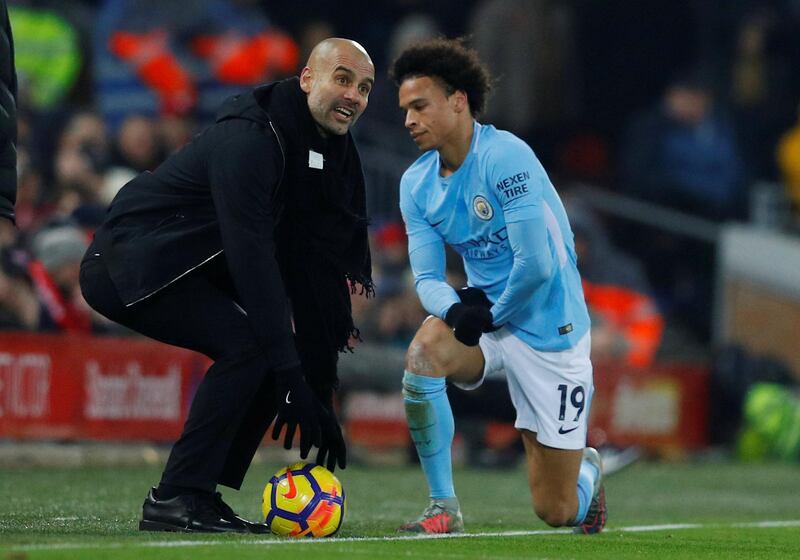There is a temptation to brand losses a reality check. Manchester City did not require one. Outsiders had got carried away by their 30-match unbeaten run in the Premier League. None of the predictions City would become Invincibles – some made ludicrously early and many with a seeming ignorance of the fact that only one English club has completed the league season undefeated since 1889 – stemmed from Pep Guardiola.
A footballing philosopher was philosophical about a first setback. The City manager knew it was coming, if not necessarily when, where or to whom. He was generous to Liverpool, and the sense was that if it he had to lose to anyone, it may as well be Jurgen Klopp, whose boldness and tactical blueprint he admires. Liverpool's 4-3 triumph was a game to suggest that, at their best and when they acquire attacking momentum, Klopp's team have the potency to beat anyone; it is a theory that may be tested in the knockout stages of the Uefa Champions League.
And if the Premier League campaign amounts to an obstacle course, Guardiola has long seemed to regard the fixture list as one of the biggest impediments. This was City’s 15th game in 57 days; their squad has been stretched defensively, as glimpses at their bench indicate, and a manager who values training-ground time with his charges has had precious little. Fatigue is a factor and some of the times City have routed opponents came when they were fresher, especially in autumn when they had fewer miles in their legs.
The images from an entertaining fixture at Anfield!
— Manchester City (@ManCity) January 14, 2018
GALLERY 📸 https://t.co/vgbev2XX9F #lfcvcity pic.twitter.com/v9judPnIlr
Their winning habit has been testament to fitness and a spirit that Guardiola has marvelled at; it has also reflected the capacity of players, Raheem Sterling in particular, to make telling late interventions. Equally, brinkmanship is not a fail-safe formula and even a team of City's standards have been run close plenty of times. The unbeaten run would have ended two weeks earlier but for Ederson's penalty stop from Crystal Palace's Luka Milivojevic. His excellent save from West Ham United's Michail Antonio, two minutes before David Silva's November winner, is another example of a turning point.
City have trailed with increasing frequency recently. They had always conjured comebacks – indeed they mustered two of sorts at Anfield – but the law of averages suggests a team will not respond every time, just as no one always comes out on top when the margins are narrow.
_________________
Read more:
- Premier League team of the week: Coutinho who?
- Richard Jolly: Liverpool survive scare to end Manchester City's unbeaten run in Premier League
- Pep Guardiola: 'You said Premier League is done and I always said 'no, it is still to be done'
_________________
Another reason why Guardiola was phlegmatic is that his brand of football is not a safety-first approach. He wants his goalkeeper to come out of his box and his defenders to pass the ball in dangerous positions. It is part of a bold approach. Over 38 games, it is threatening to pay off in spectacular fashion but it always carries the risk of backfiring in an individual match.
Nicolas Otamendi coughed up possession for Liverpool’s third goal. Ederson was stranded outside the penalty area when Mohamed Salah lobbed him for the fourth. That can happen. Ederson’s dual role, as keeper and sweeper, has nevertheless been transformative. Otamendi and John Stones’ improvement have been key. Equally, a defence anchored by both, with first a midfielder (Fabian Delph) and then a second-choice right-back (Danilo) on the left would not have been deemed unbreachable a few months ago. It is testament to Guardiola’s coaching and the team’s prowess that others made unrealistic forecasts.
They overlooked the reality that everyone, except Arsenal’s class of 2003/04, loses to someone at some stage. Guardiola, whose best Barcelona and Bayern teams were also beaten, accepted that. As it is, City’s unbeaten start to the league season was actually shorter than Manchester United’s in 2010/11; if that felt an anomaly – it was perhaps the most mediocre of Alex Ferguson’s title-winning teams – City still boast a 15-point lead. They are on course for record points (102) and goals (111) totals.
They will not be Invincibles. They may yet prove Inimitables.






